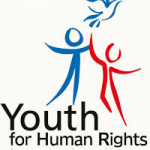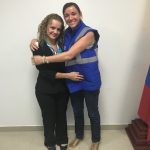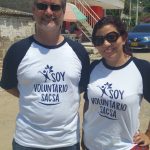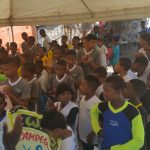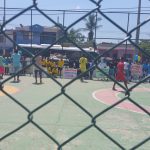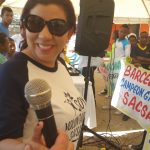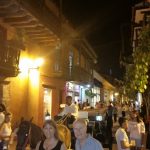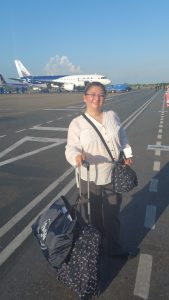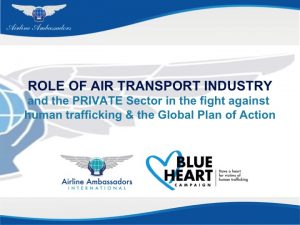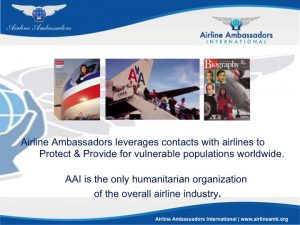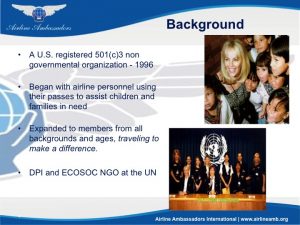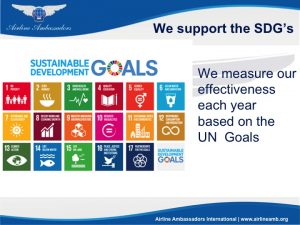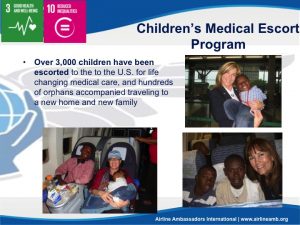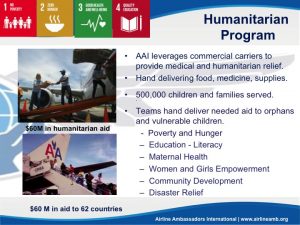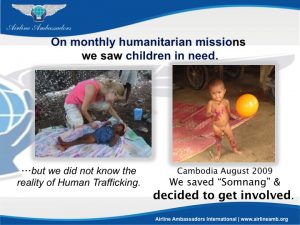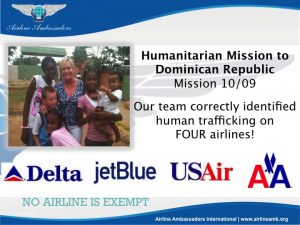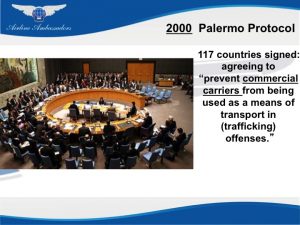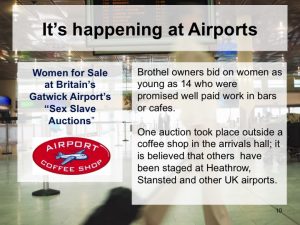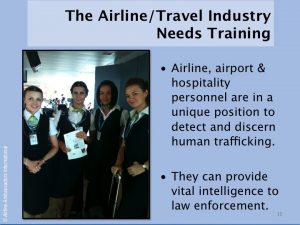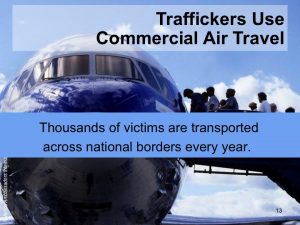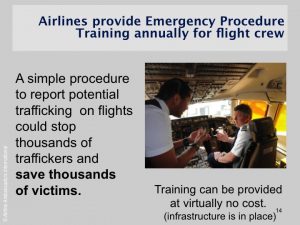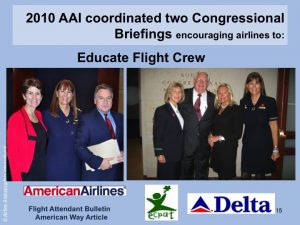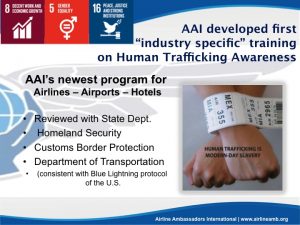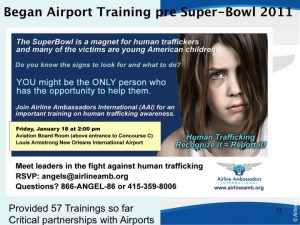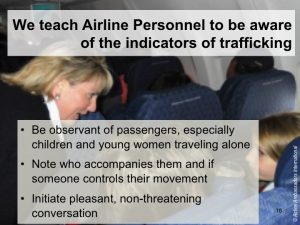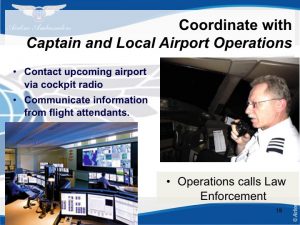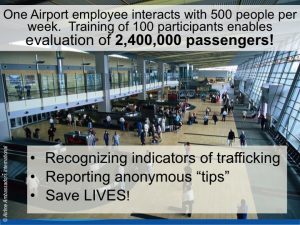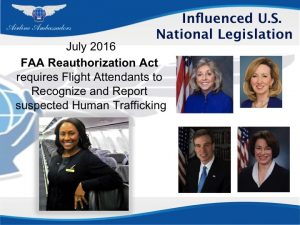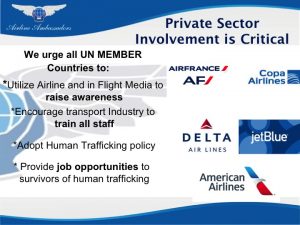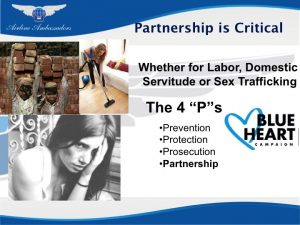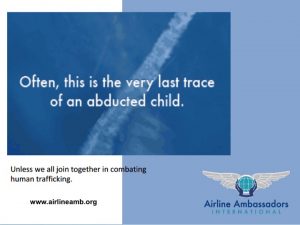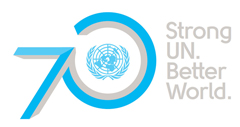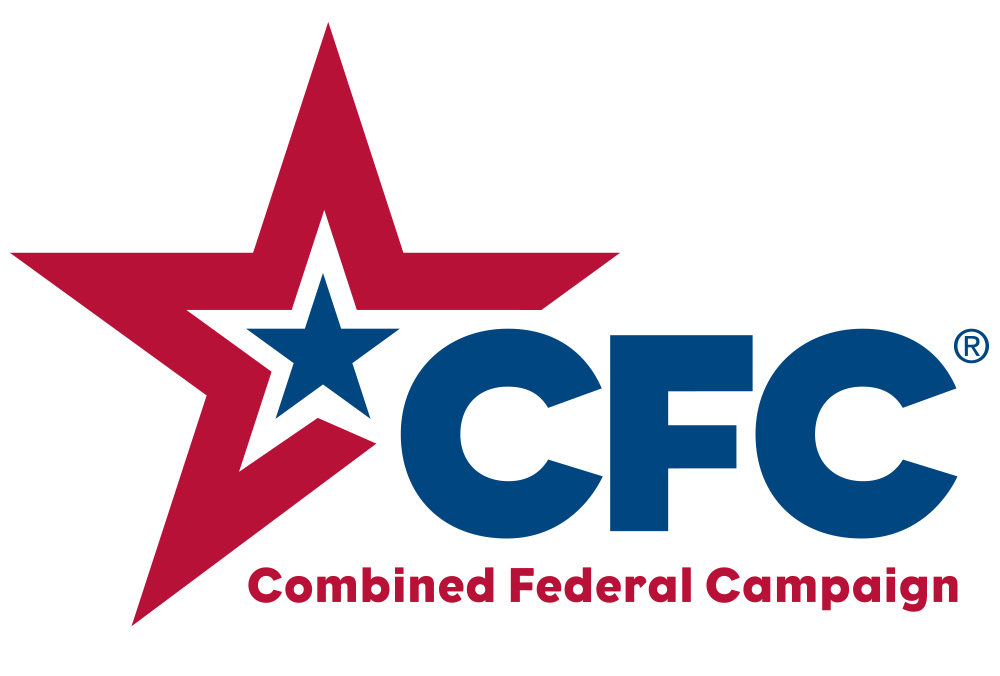EXECUTIVE SUMMARY
INTERNATIONAL ROUNDTABLE ON PREVENTION OF HUMAN TRAFFICKING
THROUGH AIR TRANSPORTATION
Vienna, Monday, 11th September, 2017
Twenty-six stakeholders in the fields of aviation, human trafficking, security and education gathered to consider how to reduce and prevent human trafficking through the critical infrastructure of the airline industry. The group had the goal of implementing a standardized system in air transportation to detect and prevent the illegal transportation of humans on commercial flights. Attendees representing government agencies, law enforcement, non-governmental organizations, private sector and civil society explored legal and practical opportunities in the development of an EU-wide shared approach, taking into account proven methods and best practices. This incorporated the understanding that only a genuinely-uniform approach involving all relevant stakeholders can be sustainable and effective, while complex and diverse rules and regulations make it harder to fight human trafficking and at the same time make it easier for traffickers to find loopholes.
Airline Ambassadors International (AAI) – Nancy Rivard, President of AAI kicked off the meeting with news that an MOU had just been signed with UNODC to partner on human trafficking awareness initiatives. She shared Airline Ambassadors’ experience spearheading awareness at airport and airline companies and highlighted recent work with AirAsia Airlines. AAI successfully influenced national legislation in the US for which flight attendant training for is now mandatory. She encouraged participants to follow the US lead by implementing awareness trainings at strategic airports, encouraging airlines to train staff, and offered a new reporting tool – the TIP Line App.
This opening was followed by short keynotes from AirAsia Foundation – Executive Director,
Mun Ching Yap, highlighting their human trafficking training program throughout Asia, their communication campaign, and the training they offered in four airport hubs in partnership with AAI;
UK Border Force – National Operational Lead Safeguarding & Modern Slavery, Amanda Read, highlighting their training programs, their existing network all over the UK, as well as their close work with law enforcement; the European Union Commission – Assistant, Office of the EU Anti-Trafficking Coordinator, Valeria Galanti, highlighting the tools and guidelines developed by the EU to combat human trafficking, including policy and legal guidelines, and the importance of fully implementing existing policies; IATA – Assistant Director External Affairs, Tim Colehan, highlighting IATA’s call to action within their industry and their initiative to adopt a 2018 AGM resolution to join the fight against human trafficking by developing and promoting guidance and training materials, improving reporting protocols, and working with airlines and airports; OSCE – Head of the Strategic Police Matters Unit/Transnational Threats Department, Guy Vinet, highlighting the importance of more visibility and awareness to reach results, and the limitation in countries that lack strict laws on the issue; OSCE – Assistant Officer on Combating Trafficking in Human Beings, Radu Cucos, highlighted the need to strengthen capacity to identify false travel IDs, and the importance of legislation that requires companies to check their supply chains beyond the first level of contracting; and UNODC – Program Management Officer, Felipe De La Torre, highlighting the work that UNODC does with member states to prevent human trafficking, and to detect and prosecute traffickers, he also shared the launching of the Blue Heart Campaign in Mexico. The roundtable was moderated by Heather Wokusch.
- Conclusions
The participants explored legal and practical opportunities for the design and development of an
EU-wide shared approach, which should serve as a model for a worldwide solution involving all relevant industries. Therefore, proven methods and practices as well as the existing legal frameworks were analyzed leading to the following conclusions:
- UNODC, EU, OSCE, UK Border Force, Crime Stoppers and Airline Ambassadors offer effective tools to detect possible victims of Human Trafficking and how to proceed in such cases.
- Directive 2011/36/EU provides an extensive legal framework on combating human trafficking including awareness raising and prevention. Its implementation through national legislation and action plans is being monitored by the EU Commission.
- UNODC is in charge of promoting the implementation of the Palermo Protocol.
- The OSCE recommends legislation in accordance to the Palermo Protocol to Non-Member States.
- IATA is currently working with its member airlines to increase awareness concerning the nature, scale and consequences of TIP through training, guidance materials, sharing best practice and working with other industry stakeholders. By mobilizing airlines in the fight against trafficking in this way, IATA believes that governments should focus on developing consistent protocols to make the reporting of suspected trafficking to the competent authorities in each country quick and simple.
- Online training can be a first step (and is surely better than no training at all) but cannot replace live training on how to detect possible victims of human trafficking and how to proceed.
- An EU-wide or even international tip line number would be useful but is difficult to implement. However, apps help in finding the appropriate national tip line number. Additional suggestion: The EU emergency number 112 (which is actually implemented in several countries outside the EU and even outside Europe) might be used as a tip line.
- The AirAsia anti-trafficking campaign – including corporate commitment, videos, and support of AAI live training for airline bases – is a best practice example.
- Proposals
For the purpose of creating a standardized system of detection and prevention of illegal transportation of trafficked persons in the air-transportation industry, we are proposing the following:
- UN resolution to call on all Member States to make live anti-trafficking training a mandatory requirement for air transport carriers as well as all air travel and hospitality industries. The live training should prepare the personnel in detection and safe reporting of potential cases of human trafficking. To be effective, the resolution has to follow a genuinely-uniform approach including all relevant stakeholders such as airlines, airports, NGOs and authorities. It has to be consistent and flexible. UNODC’s Blue Heart Campaign should be promoted through the trainings.
- In a concrete level of partnership with the private sector, IATA member airlines should take a proactive approach to implement human trafficking recognition and reporting training for staff in customer facing roles. IATA should also work with other aviation stakeholders to raise awareness of human trafficking and share best practice in terms of recognition and reporting.
- Fully implement existing programs and tools developed by UNODC (such as the Blue Heart Campaign and its Symbol, airline cards on Trafficking and Smuggling as well as innovative videos), EU, OSCE, UK Border Force, Crime Stoppers, AirAsia, as well as practices developed in the US (such as the AAI live training model at airports and airlines in Europe).
- Foster partnerships between government agencies, international organizations at the global and regional levels, like UNODC, and OSCE, as well as with private sector, academia, and Civil Society, or partnerships like the Human Trafficking Task Forces in the US. Work towards a global network to combat human trafficking, in line with UNODC-IOM-UNICEF GloAct program.
- Follow-up on existing opportunities to partner, design and implement training programs through the European airports. Those programs should be provided to all airline and airport personnel working on the front lines. The participants suggested an action plan starting with Rome, Amsterdam, and Helsinki airports.
- Recognize AirAsia’s proactive approach by launching AAI anti-trafficking presentations through the AirAsia Foundation and promote it as a best practice example that includes personnel training, general communication, an awareness campaign with a multi-channel approach and reintegration of the victims.
- Use technology to its maximum capacity to identify, report, and respond to cases of human trafficking. Also, use technological platforms such as the TIP Line App and partnership with universities to share and analyze the latest human trafficking patterns; and, to house a central information system in which all individuals and organizations can share and find information about the issue. Coordinate also with UNODC-INTERPOL-WCO AIRCOP program.
- Enhance cooperation with border authorities, and all law enforcement agencies and prosecutors’ offices, since prevention encompasses also strengthening prosecution of traffickers as a deterrent, and to change the current low-risk/high-profit equation for the criminals.
- Identify and eliminate risks. Develop risk mitigation measures in a comparable way as in supply chain risk mitigation systems. The same due diligence and standards could be applied to airlines, especially state-owned ones.
- Additional proposal: Train 112 operators in each participating country on dealing with human trafficking reports, since 112 can be used as an international tip line number.
As promoter of the goal to create a genuinely-uniform approach for relevant stakeholders to reduce and prevent human trafficking through the critical infrastructure of the airline industry, Youth for Human Rights Austria will monitor the development of suggested conclusions and keep stakeholders duly informed about the progress.
The participants commit to keep working to eradicate human trafficking in all its forms and to foster a partnership among the institutions represented at the meeting to work together toward that goal.
- Participants
AirAsia Foundation: Yap Mun Ching
Airline Ambassadors International: Nancy Rivard, David Rivard, Lourdes Venes
ANPAC Associazione Nazionale Professionale Aviazione Civile: Federico De Andreis
Cabin Safety: Sarah-Jane Prew
Crime Stoppers International: Cathy Schroeder, Ruud Smulders
DHS/ICE: James Michael Vaughn
EU Commission: Valeria Galanti
Finnair: Nina Kamsani
French Embassy, French Permanent Mission to the OSCE: Alain Bouedo
IATA: Tim Colehan, Simon Ralph, Linda Ristagno
OSCE: Guy Vinet, Ruth Pojman, Radu Cucos, Claudio Formisano
Regional Implementation Initiative on Preventing & Combating Human Trafficking: Helga Konrad
UK Border Force: Amanda Read
UNODC: Monica Belalcázar, Felipe de la Torre
US Embassy Vienna: Ursula Dorfinger
Vienneast Consulting GmbH: Stephanie Pope
Youth for Human Rights Austria: Birgit Karner, Fritz Matthias Schebeczek
Thank you to all the participants, to our moderator Heather Wokusch, to our two assistants from Zonta Golden Z Club in Vienna, and to Birgit Karner for her great support organizing this event.
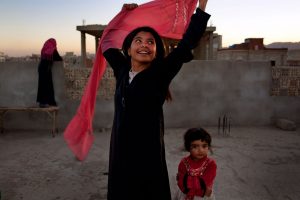 AAI Partners with Too Young to Wed
AAI Partners with Too Young to Wed
Too Young to Wed (TYTW) is a visionary nonprofit founded and led by renowned photojournalist and activist Stephanie Sinclair. TYTW’s mission is to protect girls’ rights and end child marriage by providing visual evidence of the human rights challenges faced by girls and women. For nearly fifteen years, Stephanie Sinclair and Too Young to Wed’s award-winning photographs and films have regularly appeared in the world’s leading publications, including National Geographic and The New York Times, and in partnerships with the United Nations and several national governments, educating communities and lawmakers alike and bringing unprecedented global awareness of the epidemic of child marriage.
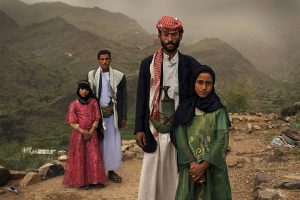 TYTW also works directly with child marriage survivors and at-risk communities. Their Tehani Photo Workshops bring girls together in an empowering retreat setting where they work together telling their own stories, learning coping skills to process their trauma, and becoming empowered to develop into tomorrow’s leaders in the fight for girls’ rights. To help ensure these and other girls have an opportunity to break the cycle of child marriage and create a brighter future for themselves, TYTW provides Leadership Scholarships in several of the countries in which they work, including their newly launched vocational education program in war-torn northern Nigeria. This program will enable adolescent girls who recently escaped from captivity and who are unable to participate in traditional education programs to develop their technical capacity, entrepreneurship, and business skills to compete in the labor market through a tailoring vocational training initiative.
TYTW also works directly with child marriage survivors and at-risk communities. Their Tehani Photo Workshops bring girls together in an empowering retreat setting where they work together telling their own stories, learning coping skills to process their trauma, and becoming empowered to develop into tomorrow’s leaders in the fight for girls’ rights. To help ensure these and other girls have an opportunity to break the cycle of child marriage and create a brighter future for themselves, TYTW provides Leadership Scholarships in several of the countries in which they work, including their newly launched vocational education program in war-torn northern Nigeria. This program will enable adolescent girls who recently escaped from captivity and who are unable to participate in traditional education programs to develop their technical capacity, entrepreneurship, and business skills to compete in the labor market through a tailoring vocational training initiative.
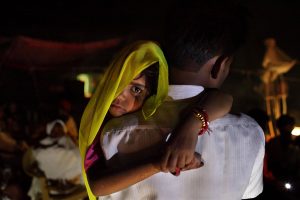 TYTW’s advocacy efforts included a visit this spring from two Boko Haram survivors, who traveled to the United States to share their stories with 37 members of Congress as well as representatives of the Department of State and the United Nations’ Commission on the Status of Women. Press coverage of their visit, through stories like National Geographic’s, and through the girls’ own words during their interview on PBS Newshour, garnered significant support for their cause. This visit resulted in the recent introduction of a bipartisan Senate resolution condemning Boko Haram and urging strong US support for survivor services for the thousands of girls who have suffered at the hands of this terrorist group. As Senator Susan Collins (R-ME) said, “This resolution recognizes the extraordinary bravery of the survivors of Boko Haram, two of whom I had the honor to meet with last month to listen to their stories.” A corresponding bipartisan resolution will soon be introduced in the House of Representatives, recognizing the impact that these brave young women had on all the members of Congress with whom they met, and ensuring that the plight of all the girls being held in captivity will not be forgotten by the world, and that help will soon be on the way.
TYTW’s advocacy efforts included a visit this spring from two Boko Haram survivors, who traveled to the United States to share their stories with 37 members of Congress as well as representatives of the Department of State and the United Nations’ Commission on the Status of Women. Press coverage of their visit, through stories like National Geographic’s, and through the girls’ own words during their interview on PBS Newshour, garnered significant support for their cause. This visit resulted in the recent introduction of a bipartisan Senate resolution condemning Boko Haram and urging strong US support for survivor services for the thousands of girls who have suffered at the hands of this terrorist group. As Senator Susan Collins (R-ME) said, “This resolution recognizes the extraordinary bravery of the survivors of Boko Haram, two of whom I had the honor to meet with last month to listen to their stories.” A corresponding bipartisan resolution will soon be introduced in the House of Representatives, recognizing the impact that these brave young women had on all the members of Congress with whom they met, and ensuring that the plight of all the girls being held in captivity will not be forgotten by the world, and that help will soon be on the way.
To donate miles to support To Young to Wed CLICK HERE 
 Bravo to AirAsia Airlines and the US Embassy in Malaysia for supporting trainings at Air Asia’s four largest bases at the four largest crew bases for Air Asia of Kuala Lumpur, Manila, Jakarta and Bangkok. The whole team including Nancy Rivard, former AA flight attendant and President of Airline Ambassadors, Andrea Hobart, Alaska Airlines flight attendant and director of AAI’s Training program, and Donna Hubbard, AA flight attendant and survivor of human trafficking felt Air Asia’s support was GROUNDBREAKING and were inspired with this airline, run like a family with a deep commitment to one another, the communities they serve and corporate social responsibility.
Bravo to AirAsia Airlines and the US Embassy in Malaysia for supporting trainings at Air Asia’s four largest bases at the four largest crew bases for Air Asia of Kuala Lumpur, Manila, Jakarta and Bangkok. The whole team including Nancy Rivard, former AA flight attendant and President of Airline Ambassadors, Andrea Hobart, Alaska Airlines flight attendant and director of AAI’s Training program, and Donna Hubbard, AA flight attendant and survivor of human trafficking felt Air Asia’s support was GROUNDBREAKING and were inspired with this airline, run like a family with a deep commitment to one another, the communities they serve and corporate social responsibility.
See video message Air Asia is sharing with all employees
Air Asia plans to train all employees and is doing a spread also in their in-flight magazine. In flight magazine story on the visit and media clips from the trip at links below:
Airlines Fight Against Human Trafficking
Asia’s Biggest Budget Airline Trains Crew to Recognize Human Traffickers
June 7,2017
I’m pleased to inform you that the US Embassy has approved our grant application so it’s on! We will receive the funds later this month. Are you available for a Skype call for us to discuss some preparations? per our discussion several weeks ago, we would like to invite an Airline Ambassador’s team to AirAsia for a meet a share session with our cabin crew members. This would be conducted at our four main hubs – Kuala Lumpur, Bangkok, Jakarta and Manila. We believe this is an important part of getting crew involved in the programme as the sharing will be peer to peer sharing rather than from management. We are kicking off our Anti-Trafficking Initiative next week with a series of meetings and module development trainings.
 Since the 2026 TIP Report rates Malaysia and Thailand at Tier 3 – this effort can have a significant effect on crew awareness and we look forward to inspiring our c0lleagues at Air Asia.
Since the 2026 TIP Report rates Malaysia and Thailand at Tier 3 – this effort can have a significant effect on crew awareness and we look forward to inspiring our c0lleagues at Air Asia.
 Our international team will include Nancy Rivard, Donna Hubbard and Andrea Hobart.
Our international team will include Nancy Rivard, Donna Hubbard and Andrea Hobart.
 Aug. 7, 2017 Pedophilia Bust thanks to observant passenger and flight crew coordination
Aug. 7, 2017 Pedophilia Bust thanks to observant passenger and flight crew coordination
San Jose police said they arrested Michael Kellar, 56, in the city’s airport Monday night after a flight from Seattle. Kellar’s texts led officers to arrest Gail Burnworth, 50, in her Tacoma home. Kellar also lives in that city.
It appears two children, ages 5 and 7, were sexually assaulted, investigators said. Authorities say Burnworth had access to children as a baby-sitter and that Kellar was getting to the victims through her.
Seattle and San Jose police declined to discuss the children’s relationship to the suspects and how Kellar and Burnworth knew each other.
The plane passenger told authorities that Kellar was sitting in front of her and texting about the abuse with a large font on a large smartphone. The font and screen were so big that the passenger was able to take photos of Kellar’s text conversation, police said.
The passenger, who police didn’t identify, alerted the flight crew. A flight attendant notified an officer stationed at the airport, and Kellar was arrested.
He is accused of attempted child molestation and solicitation of a sex crime. Burnworth was arrested on suspicion of child rape and sexual exploitation of children.
Kellar and Burnworth are in jail Wednesday, and it’s was not known if they have lawyers to speak on their behalf.
She’s a hero’: flight attendants on woman who alerted authorities to child sex abuse
|
|
Aug 8 (1 day ago) |
|
|||
September 6 – 9, 2017 HAITI
Back to School Service Trip to provide vital school supplies so these children can attend School.
School! will be reopening soon, and kids all over the US will head back to their classrooms, to homework and lunch boxes. However, for most children in Haiti, going back to school is a beautiful but often unattainable dream. Why? because they are in danger of missing school simply because they cannot afford to purchase their schoolbooks and basic school supplies. We can help
 Volunteers will help the team of Diakonos International prepare disadvantaged children for the 2017-2018 school year by donating and collecting new school backpacks, filling them with school supplies and toiletries to be distributed on September 7th and 8th to the children living in Diakonos’ Small Community of Family, as well as other children in the communities of Carrefour and Port-au-Prince.
Volunteers will help the team of Diakonos International prepare disadvantaged children for the 2017-2018 school year by donating and collecting new school backpacks, filling them with school supplies and toiletries to be distributed on September 7th and 8th to the children living in Diakonos’ Small Community of Family, as well as other children in the communities of Carrefour and Port-au-Prince.
TRIP VOLUNTEERS – BE SURE TO BUY AT LEAST 1 BACKPACK AND SELECT SUPPLIES ONLY FROM THE LIST ON THE LEFT PLEASE!
Other Donations needed:
PENS: Bleu, RED,
PENCILS
CRAYONS
RULERS
ERASERS
PENCIL SHARPENERS
GEOMETRIC SETS CALCULATORS
GLUE
COMPOSITION BOOKS (NO SPIRAL BOUND NOTEBOOKS PLEASE!)
PENS/PENCIL HOLDERS
CONSTRUCTION PAPER
CANDIES/COOKIES
To join trip
Email martine.longchamp@airlineamb.org
Wednesday, September 6thTravel day arriving in Port-au-Prince 12:00 pm – Transfer to Hotel 1:00 pm – Depart to Kominote Ti Fanmi de Diakonos Children’s Home 2:00 pm – Lunch / Meet and greet 5:00 pm – Depart to Hotel 6:00 pm – Volunteer Orientation Thursday, September 7th8:00 am – Breakfast at Lodging 9:00 am – Sort School Supplies 11:00 am – Depart for Tour of Port-au-Prince 12:00 pm – Lunch in Port-au-Prince 2:00 pm – School Distribution/Children’s Home 5:30 pm – Depart for Hotel
|
|
|

 AAI Trainers, Christina Andersen, Dottie Princi and Lynn Duddy hosted a Human Trafficking Training at JFK, Wednesday August 30. It had a great turnout including Base Manger Chris Hoogstad and several other Flight Service Managers. Also in attendance were LGA Chief Pilot and EAP Director Ellen Kravats. We were especially pleased to have DHS Homeland Security officers, Dan Sudan and Tenaz Dubash speak on behave of Victim Advocacy. It was amazing to hear the testimony of Elizabeth Newberry, DCA based flight attendant, who shared the story of the trafficking incident she intercepted on her flight. We would like to thank all those who attended and participated and look forward to seeing you all again at future trainings!
AAI Trainers, Christina Andersen, Dottie Princi and Lynn Duddy hosted a Human Trafficking Training at JFK, Wednesday August 30. It had a great turnout including Base Manger Chris Hoogstad and several other Flight Service Managers. Also in attendance were LGA Chief Pilot and EAP Director Ellen Kravats. We were especially pleased to have DHS Homeland Security officers, Dan Sudan and Tenaz Dubash speak on behave of Victim Advocacy. It was amazing to hear the testimony of Elizabeth Newberry, DCA based flight attendant, who shared the story of the trafficking incident she intercepted on her flight. We would like to thank all those who attended and participated and look forward to seeing you all again at future trainings!
The Escort Program is busy as ever this summer. This weekend there are 14 trips for orphans from Ukraine and Poland who have spent summer holidays in the US with foster families. Thanks for so many volunteer flight attendants for their help.
However we have three trips uncovered and we need volunteer active flight attendants who are jump-seat qualified to help:
PLEASE CONTACT Margaret Whitehead at Mmwhitehead3@aol.com if you are available this month
Volunteer escort Shenae bringing 10 month old Jolie back to Burkina Faso
 AAI partnered with UNODC to provide training in Cartagena Colombia law enforcement and airport personnel at Cartagena’s Airport on July 21, 2017
AAI partnered with UNODC to provide training in Cartagena Colombia law enforcement and airport personnel at Cartagena’s Airport on July 21, 2017
This training was made possible with support of the Girls Rights Foundation. Training team includes Carlos Perez of UNODC, survivor Marcella Loaiza and Andrea Bravo of the Marcella Loaiza Foundation, Alma Valadez and Jose Redondo. The team visited with local NGO identified by SACSA to see programs for children most vulnerable to child exploitation.
Cartagena is known as a sex tourism destination in the America’s – We applaud the efforts of our colleague Operation Underground Railroad for staging a dangerous rescue here in 2014.
We continued to visit the projects of SASCA supporting the girls and boys vulnerable to sexual Exploitation…See this THANK YOU from the kids and see pics below
Read this report from Insight Crime:
RawFeed: Child Prostitution in Cartagena
With an estimated 35,000 sexually exploited minors in Colombia, child prostitution is a widespread and lucrative industry. And, as symbolized by the sentencing last year of an Italian pedophile, the first such conviction in Colombia, “sex tourism” involving children has grown alongside the licit tourist industry in popular destinations like Cartagena.
 In a three-part video series, “Children of the Wall,” El Espectador takes a look at the prostitution of children in Cartagena. The colonial city is best known as a stopover for Caribbean cruises, attracting between 400,000 and 700,000 tourists a year. But not all visitors come with good intentions.
In a three-part video series, “Children of the Wall,” El Espectador takes a look at the prostitution of children in Cartagena. The colonial city is best known as a stopover for Caribbean cruises, attracting between 400,000 and 700,000 tourists a year. But not all visitors come with good intentions.
Last year Cartagena officially registered 400 cases related to the sexual exploitation of minors, according to the Prosecutor General’s Office. The number of unreported cases is likely to be many, many more.
El Espectador identified three common business models for child prostitution rings in the city. The first is brothels, where young girls either live or are contracted out by day. Some sex dens are sophisticated enough to provide girls with fake IDs once they begin work, but not all brothels are as organized. As observed by General Ricardo Restrepo, chief of police for Cartagena, there have been some cases of mothers hiring out their daughters  for 15,000 pesos (about $8), which includes payment for using a room in their own house.
for 15,000 pesos (about $8), which includes payment for using a room in their own house.
Another common form of child prostitution is known colloquially as ‘pre-pagos,’ or escort services, which involve minors working with pre-arranged clients, sometimes organized through marriage or dating websites. Girls may also be deployed by pimps to bars and clubs, in an attempt to target wealthy, often foreign, potential clients.
The third is perhaps the most informal form of prostitution: girls from broken homes in working class neighborhoods who are coerced by neighbors or acquaintances into selling sexual favors, for fees as low as 2,000 or 5,000 pesos (between US$1.70 and US$2.70).
Our team was so moved by these projects we made a decision to return to help the local children and support the human trafficking awareness in the airline community…We are planning another visit on December 15 when American Airlines inaugurates a new route Miami – Cartagena on December 15, 2017. See this video at one of the projects and pics below of the soccer program. Projects were identified with the support of SACSA – the Sociedad Aeroportuaria de la Costa SA
Cartagena is a beautiful and historic city and we had some fun too – traveling to make a difference!
A HUGE THANK you to our selfless escorts who volunteer their time to accompany kids for life changing medical care and for for Ukrainian children coming to the United States for Summer holidays! Here’s a report from Program Director – Margaret Whitehead:
It’s been a busy two weeks. First, retired DFWAA flight attendant Janice Freeman accompanied two 15 year old girls from CDG to CMH for donated medical care. Then Debbie Baird and Shenae Johnson, both from DFW Res took little 4 year old Ma back to CDG and handed her over to an ASF escort for the final leg of her journey home to Abidjan after a recheck of her retinablastoma surgery. Makayla Mickelle, DFWAA flight attendant did her very first escort since joining the program when she took Ma from CMH to PHL where they met up with Debbie and Shenae. Now that Makayla’s feet are wet. we hope she’ll be doing some of our longer trips in the future. And speaking of that, this was only Shenae’s second escort ever but Debbie is very experienced so she was able to show Shenae exactly what is involved with our CDG trips. They had a quick visit to CDG, then brought two little medical patients back. PHLAA flight attendant Betty Taylor met them in CLT and took little Glorias on to PHL ORD AA flight attendant Kyle Rogers also did a CDG trip, taking a 4 year old from CMH back to CDG and bringing a baby back to CMH. The CMH/CDG shuttle was very much in full swing during these two weeks. Joanne Striker accompanied Ahmad, a teenager from Jordan, from LHR to STL where he would have a re-fitting of his prosthetic leg.
 June 26th we again accompanied 11 Ukrainian orphans to their host families throughout the US. A huge thank you to those escorts, Ken Nettles, Tammy Meade and Tamara Bessette, Stephanie Jasper, Rosie Plog, Cindi Sinkler, Tej LIntala, Shawn Noblit, Mary Rhoden Lobban, Sheila Svoboda and Dorothy Olson. ORD flight attendant Soad Hamdan was the airport coordinator for this group and all her hard work made the entire afternoon and evening run exceptionally well. We could not have done it without her. Nor could we have done it without ORD Flight Service. Claire Madden and Karen Parker both helped us in so many different ways and because of the private room they were able to secure for us, we had a nice place for the kids to wait, many of them for long hours before their connecting flights left. We were sad that, at the last minute, the Polish government decided that more paperwork was needed before the Polish orphans would be allowed to travel.
June 26th we again accompanied 11 Ukrainian orphans to their host families throughout the US. A huge thank you to those escorts, Ken Nettles, Tammy Meade and Tamara Bessette, Stephanie Jasper, Rosie Plog, Cindi Sinkler, Tej LIntala, Shawn Noblit, Mary Rhoden Lobban, Sheila Svoboda and Dorothy Olson. ORD flight attendant Soad Hamdan was the airport coordinator for this group and all her hard work made the entire afternoon and evening run exceptionally well. We could not have done it without her. Nor could we have done it without ORD Flight Service. Claire Madden and Karen Parker both helped us in so many different ways and because of the private room they were able to secure for us, we had a nice place for the kids to wait, many of them for long hours before their connecting flights left. We were sad that, at the last minute, the Polish government decided that more paperwork was needed before the Polish orphans would be allowed to travel.
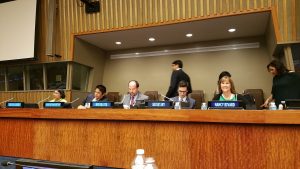
 AAI’s President Nancy Rivard presented to the United Nations General Assembly on June 23, 2017. See invitation and presentation below
AAI’s President Nancy Rivard presented to the United Nations General Assembly on June 23, 2017. See invitation and presentation below
Dear Ms. Rivard,
On behalf of the Office of the President of the General Assembly, I have the honour to invite you to participate as an expert speaker in the informal interactive multi-stakeholder hearing on Trafficking in Persons to be held in 23 June 2017, at the United Nations Headquarters in New York.
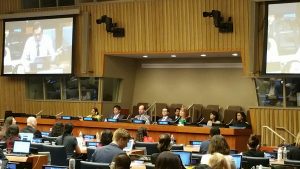 This multi-stakeholder hearing is being convened in support of the preparatory process towards the High-level Plenary Meeting to appraise the progress achieved in the implementation of the Global Plan of Action in order to assess achievements, gaps and challenges, including in the implementation of the relevant legal instruments.
This multi-stakeholder hearing is being convened in support of the preparatory process towards the High-level Plenary Meeting to appraise the progress achieved in the implementation of the Global Plan of Action in order to assess achievements, gaps and challenges, including in the implementation of the relevant legal instruments.
As poverty, inequality, humanitarian emergencies, sexual violence, gender discrimination, social exclusion, as well as violence against women, youth and children are, among others, the factors for human trafficking in our world today, an understanding of these factors and of existing normative, policy and legal instruments, as well as of tailored responses to these in a manner that serves the needs and expectations of trafficked persons and countries, is of fundamental importance. We hope that some of the key messages emanating from this informal hearing will assess achievements, gaps 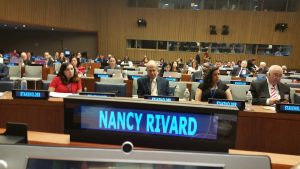 and challenges, in the implementation of the Global Plan of Action and the implementation of the relevant legal instruments.
and challenges, in the implementation of the Global Plan of Action and the implementation of the relevant legal instruments.
I am convinced that the third panel on “Trafficking in persons in the context of the 2030 Sustainable Development Agenda” would greatly benefit from your participation.
Sincerely yours,
Grace Angeles





